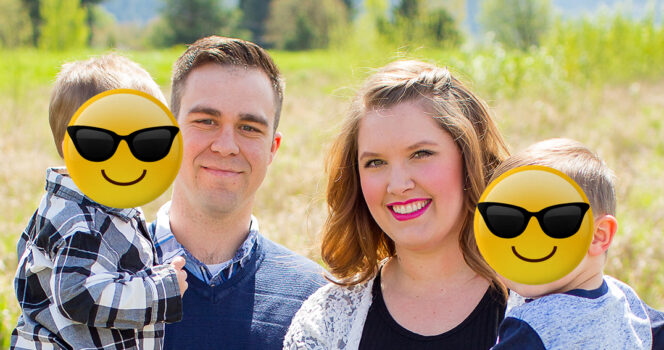
For years, parents on social media have believed they’d found the perfect compromise: post adorable snapshots of their kids, but hide their identities by slapping a smiley face or heart emoji over them.
From Hollywood moms like Meghan Markle and Kristin Bell to everyday families, the “emoji shield” became a trend that felt like safe sharing.
But according to cybersecurity experts, that sense of safety is nothing more than an illusion — one that could put children at serious risk.
Of course, none of this is to suggest that you’re a bad parent for doing this. Being proud of your kids is hardly a sin. And choosing how much to share online is a highly personal decision, shaped by everything from family traditions to social circles. But experts say there’s an important distinction between harmless pride and digital risks that could follow children for years to come.
Why emojis don’t protect kids online
The harsh reality is that covering a child’s face with an emoji doesn’t prevent strangers from identifying them. Experts say the rest of the photo — backgrounds, clothing, locations, even small details like timestamps — can be pieced together to form a disturbingly accurate picture of a child’s life.
“I need to be brutally honest here: putting an emoji over a child’s face provides virtually no real privacy protection whatsoever,” warned Lisa Ventura, an award-winning cybersecurity specialist and founder of Cyber Security Unity, in an interview with The Independent.
“This approach is more security theatre than actual security.”
What’s worse, artificial intelligence can now digitally remove emoji stickers and reconstruct the hidden face beneath them, meaning predators could gain access to images parents thought were protected.
The bigger problem
The issue isn’t just one photo. Most parents post hundreds of pictures over time, and when combined, these snapshots reveal school names, routines, favorite hangouts, and even neighborhoods.
“Most parents aren’t just posting one carefully emoji-protected photo,” Ventura explained.
“They’re sharing multiple images over time, and the combined data from all those posts creates a much bigger privacy concern than any single image.”
This information can be exploited by criminals for identity theft, blackmail, and even child exploitation material.
Real risks that last for years
Christoph C. Cemper, founder of AIPRM, warned NetMums that oversharing children’s details can lead to fraud that may go unnoticed for years. Criminals can use children’s personal information to open fake accounts, which often won’t be detected until they’re older.
Photos can also fuel cyberbullying, harassment, and manipulation. Police say even innocent images of kids are regularly stolen from social media and repurposed in disturbing ways, including use in abusive forums.
Kids can’t consent
One of the biggest concerns experts raise is that children don’t get a say in what’s posted about them. Once photos are online, they’re effectively permanent, and could resurface years later during college applications, job hunts, or relationships.
“Children deserve to have that right protected until they’re old enough to make informed decisions about their own digital footprint,” Ventura said.
Safer alternatives for sharing
Cybersecurity specialists suggest parents rethink how they share family moments online. Instead of posting publicly, safer options include:
- Private group chats with trusted family members
- Encrypted messaging apps like Signal
- Private cloud albums for relatives
- Posting only photos that don’t reveal faces or identifying details
Some parents have also gotten creative, using hats, sunglasses, or simply photographing their kids from behind. And before posting anything, Ventura says parents should always ask themselves one simple question:
“If you wouldn’t hand a physical copy of that photo to a complete stranger in the street, don’t post it online. Because that’s essentially what you’re doing, except that stranger might be able to keep it forever, or worse, use it in unauthorized ways you did not intend.”
The bottom line
What feels like a harmless scroll-stopping post could have consequences parents never intended. Emojis may cover a face, but they don’t cover the trail of data every photo leaves behind.
It might mean fewer likes or comments, but protecting a child’s future is worth far more than a few seconds of online attention.
If this article made you stop and think, consider sharing it with other parents in your circle. The more people know, the safer our kids can be — not just today, but for the future they deserve.
READ MORE
- Bride-to-be shares incredibly unfortunate new name she’ll have after getting married
- Chilling last words of ‘Killer Clown’ John Wayne Gacy




